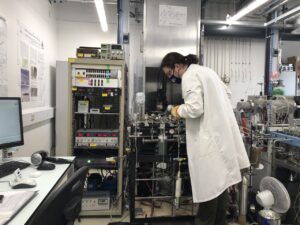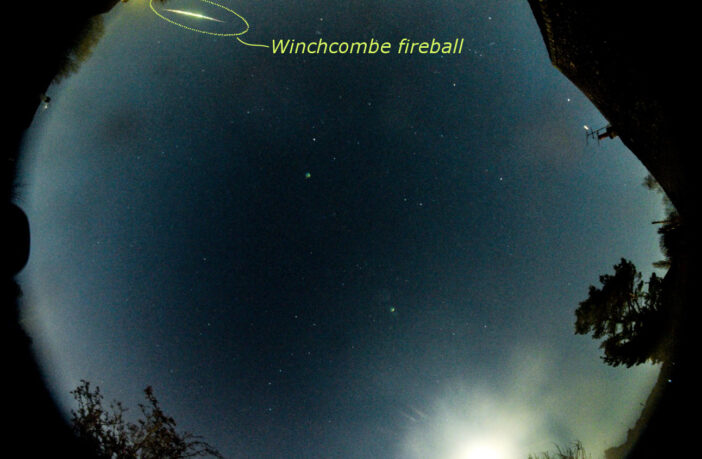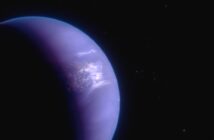The Winchcombe meteorite, a rare carbonaceous meteorite which crashed onto a driveway in Gloucestershire, has been found to contain extra-terrestrial water and organic compounds that reveal insights into the origin of Earth’s oceans.
A new study by experts from The Open University (OU), Natural History Museum and the University of Glasgow reports the orbital history and first laboratory analyses of the Winchcombe meteorite, which was recovered only hours after its spectacular fireball lit up the skies over the UK in February 2021.
Dr Martin Suttle, Lecturer in Planetary Sciences at the OU hosted a fireball observation camera on the roof of his own house, from which datasets were used to track the meteor and predict its fall location.
Dr Suttle commented on the latest findings:
“The data presented in our new paper reveals the orbital history and first laboratory analyses of the Winchcombe meteorite. It’s an exciting study that explores one of the most pristine meteorites ever recovered. For me it really underscores the type of outstanding science that can be achieved when we work together.
“The entire project from the very moment the fireball lit up the sky right through to the analysis of rock fragments and writing of the paper was a community effort. This rock’s been zapped by a dizzying array of microanalysis techniques allowing us to reveal just a few of the mysteries hidden within it.”
Analysis of the Winchcombe meteorite by specialists from across the world began within days of the fall. Through detailed imaging and chemical analyses, the team determined that Winchcombe contains approximately 11% extra-terrestrial water (by weight), most of which is locked-up in minerals that formed during chemical reactions between fluids and rocks on its parent asteroid in the earliest stages of the solar system.
Crucially, the team were able to quickly measure the ratio of hydrogen isotopes in the water, finding it to closely resemble the composition of water on Earth. Extracts from the Winchcombe meteorite also contain extra-terrestrial amino acids – prebiotic molecules that are fundamental components for the origin of life. As the composition of the Winchcombe meteorite is largely unmodified by the terrestrial environment, these results indicate that carbonaceous asteroids played a key role in delivering the ingredients needed to kickstart oceans and life on the early Earth.

Dr Ross Findlay of the OU analysing oxygen isotopes
Experts from the OU have been heavily involved in Winchcombe’s discovery and analysis. Dr Richard Greenwood, Senior Research Fellow, was the first person to meet with the Wilcock family and confirm the sample as a meteorite:
“The Winchcombe meteorite is quite simply the most important space rock to have ever been recovered in the UK. So, it was an incredibly exciting experience to have been the first scientist to identify this amazing meteorite. I also had the privilege of leading one of the scientific teams studying Winchcombe.
“Our isotopic results are included in the new Science Advances paper, which brings together the research work of collaborating scientists from across the UK and beyond. Winchcombe has helped us gain fresh insights into the early history of our Solar System. But the work is not over yet! Winchcombe still has many more secrets to reveal.”
Dr Natasha Almeida, Curator of Meteorites at the Natural History Museum and co-author says:
‘We’re still reeling from our good fortune to have such an important meteorite fall in the UK, and are so grateful to the local community for their donations and the UK’s cosmochemistry network for coming together to produce this extensive study. The combination of such a quick recovery, careful collection, and our ongoing curation of Winchcombe in a nitrogen atmosphere means this incredibly fresh specimen will remain one of the most pristine meteorites in collections worldwide.”
Dr Suttle added:
“The other key ingredient to our success was the involvement of citizen scientists in the observation of the fireball and the search and recovery of the meteorite. I still find the whole saga a little unbelievable, Winchcombe will keep us busy for a long time to come!”



